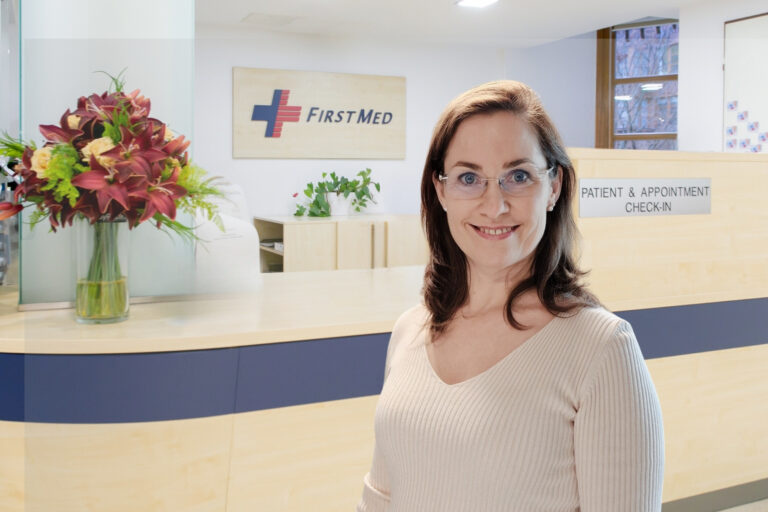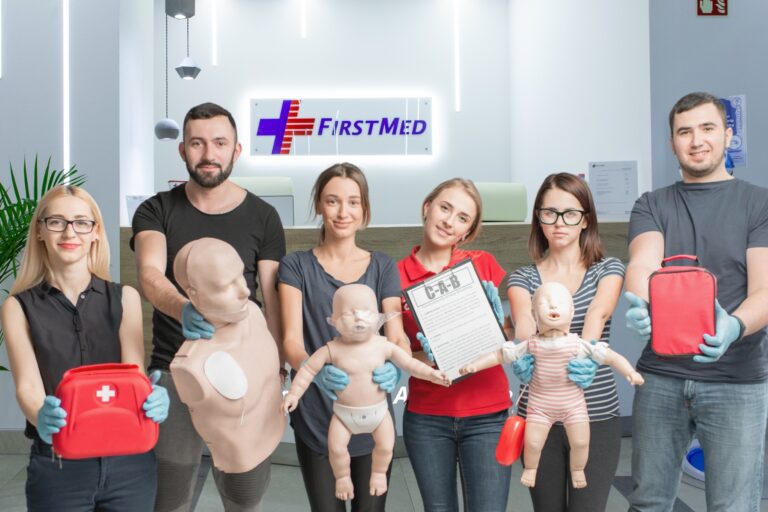We spoke with Izabella Henter, FirstMed’s dietitian about her background and to see how she came to work with FirstMed.
I have heard that you are very active and busy. How has your career evolved so far?
I was born into a semi-medical family. My father, an electrical engineer, specialized in X-rays and had many friends who were medical doctors and spent much time at our home. I know he would have preferred me to become a dentist, but as I was flipping through the 1977 Almanac for higher education, I accidentally came across the relatively new field of dietetics at HIETE (Haynal Imre University of Health Sciences) and decided it was for me. With my family connections to many influential people, I wanted to take advantage of easy access to a university I could have. Instead, I had faith in myself and did it all on my own, and have done so ever since. My faith in myself never fails me.
Finishing my studies in 1980, I began work at the National Institute of Rheumatology and Physical Therapy, better known as ORFI. There I was able to try my skills in the various departments so by the time I began working at the Children’s Clinic #1 of Budapest I had already gained much useful experience. After the birth of my first child I continued to work there which gave me more time to focus on the field of pediatric dietetics. A little bit later I had two more children so I was spending much more time at home raising them, therefore during this period I worked as a substitute.
With time I changed workplaces again and continued in the gastroenterology department of the Madarász Street Children’s Hospital, but still only part-time. There I had the privilege to experience teamwork in a way which was quite rare in Hungary at the time. One time we had our workflow assessed by the Dutch company Nutricia, now a part of the Danone Group. I was greatly surprised when they took a special interest in me and invited me to join their team right then. With that move I was entering in a new world; I was probably the first dietician from Hungary to have the chance to work for an international company in this field.
I began working at the infant formula section due to my experience in gastroenterology, a must for that field. After a few years I was transferred to the department of clinical artificial nutrition, which brought a very diverse, stimulating life full of travelling, trainings, and making many new interesting acquaintances. I stayed with Nutricia for about 13 years, accompanying them through highs and lows, but after a while I could not identify with the current work style of the company therefore I decided it was time to leave.
Despite the fact that in Hungary, as opposed to the US or Western Europe, there was little demand for dieticians, I chose to become a freelance consultant. Fortunately for me a few months after heading out on my own the National Child Health Institute was searching for a dietician. I have been working there part-time ever since.
How have you kept up with all the changes in dietetics?
Since then, outside of receiving my PhD in nutritional sciences, I have also become a certified healthcare manager. For the past three years I’ve been heading the Dietetics and Human Nutrition Department for the Organization of Health Professionals under the Health and Social minister. Among my specialized activities I have represented Hungary in the Association of European Dietetics for the past 14 years, given diet and nutrition lectures at companies, written articles, co-authored books, worked as a contributing editor for the Új Diéta (New Diet) magazine, and sometimes cook. My work covers a broad spectrum.
Such as FirstMed. You have been working here for a few years now. How do you find it?
Although I am spending more time with institutes at the moment, time spent at FirstMed is still one of my favorites. My colleagues are very kind and helpful, which I appreciate even more since I am not coming to the clinic all that often. I do not feel that the team is tired of having to explain technical and operational details to me more often than to regular doctors. There is a positive aura here, you can feel the unity, the collegiality. I feel that FirstMed provides a quality service, besides which the human factor is also present: good sense of humor, positive gestures, which provide a great asset when it comes to healing. I like talking to people and not only about directly related questions, but their general well-being, as I do not believe in impersonal medicine. I believe I can put more into a consultation than those who have to see 8-10 patients per day.
What problems do people turn to you with?
The first thing you associate dietitians with is losing weight and I have to admit that many overweight people find me for help with their weight issues. Our weight can be deceiving as it is not the number we see on the scale but our body composition that counts. Many people with a normal BMI (body mass index) have tendencies of steatosis (fatty degeneration), which can be unhealthier than having a few extra kilos. Try to monitor your body composition regularly; there are relatively low-priced scales that also measure body composition.
I also have several healthy patients who only want to become better informed about how to eat properly given all the cross communication from the media on nutritional supplements and fad diets. Once I unravel a patient’s goal, it is normal for the two of us to come to an understanding regarding eating habits and lifestyles. I like to involve my patients in the decision process. There are people whose laboratory results come back normal, yet they feel unwell. Then during our conversation it turns out how much they feel on the right track in their lives, how content and positive they are. Sometimes what they need is mental and/or emotional support.
Does it count how happy we are?
Contentment, positive attitude, human relationships, good company, meaningful conversations, they all count when it comes to health. I meet a lot of foreigners at FirstMed and what I see is that most of the time they do not have financial problems but they live far from most of their loved ones and they hardly see their close family.
How do you give advice?
I do not like to give orders and I typically do not create sample menus as they’re usually very hard to follow. We agree on a ‘mosaic menu’, which contains several variations for breakfast, lunch, dinner and snacks that the patient can choose from. It also lets them think and be a little independent or creative within their boundaries. I like to openly discuss their tastes, since it would be counterproductive to include something like sorrel in someone’s diet when they know from start that they don’t enjoy it. I encourage everyone to maintain a two-way conversation with their doctor and give him/her feedback when they have a different opinion. Let’s take responsibility for ourselves. I am not a paternalistic doctor. I like it when the patients have opinions. We openly communicate as equals and there is a place for jokes since they have health benefits.
Not all workplaces operate in a way which I could have my own way and I could follow my own work ethic but at FirstMed I am given the freedom to do my job the way I feel is best. I’m at a stage in my life when I can choose the environment that suits me best and only work where I like. I encourage everyone to pursue their dreams.
Contact us to make an appointment with Izabella Henter.




